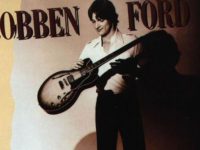Given that he’s one helluva performer, Robben Ford put out Soul on Ten at just the right time.
After 1998’s The Authorized Bootleg, the jazz/soul-flavored blues guitarist moved on from his Blue Line power trio to record four studio records (and a live tribute to Paul Butterfield’s music under the auspices of the Ford Blues Band). True, there were also a couple of concert DVD’s. But when Soul on Ten arrived on Aug. 11, 2009, Ford fans finally got live versions of his newer studio material and a few reworkings of some electric-blues standards.
Even though hearing these songs rendered live was a big draw, it goes without saying that the main ticket remained his guitar playing. Years ago, somebody said Robben Ford has forgotten more guitar licks than most guitarists will even learn. Every time I hear Robben rip on his axe, I realize that declaration is no exaggeration: He seems to come up with fresh new licks every time he solos. He’s soulful, creative, complex and tasty as they come.
Backed by a lean-and-mean drums and bass rhythm section with Neal Evans’ organ dropping by for five of the eight live tracks, Ford chose some of the better cuts from three of his last four albums for Soul on Ten and, more crucially, songs that translate well to the stage.
From the opening chords of first cut “Supernatural,” I was taken aback not so much at Ford’s wah-wahed rhythm guitar, but a heavy, booming and slippery bass accompanying him. Turns out it was Larry Carlton’s boy, 26-year-old Travis. (Step aside, Wolf Van Halen.) Ford, who often unfairly receives criticism for an unimaginative singing voice, does nevertheless improve on the studio version from the 1999 album of the same name with phrasing and feel, perhaps because there’s no Michael McDonald-led backing vocals to fall back on. The showstopper is still Ford’s masterful negotiation with that wah, and he works it like no one has since Jimi Hendrix was alive.
[SOMETHING ELSE! INTERVIEW: Robben Ford joined us for a Something Else! Sitdown to discuss the back-to-his-roots studio follow up to ‘Soul on Ten,’ Joni Mitchell, George Harrison … and Kiss?]
“Indianola,” the instrumental taken from Blue Moon, was also superior to the studio version. Although running at nearly identical length, the lack of a vibe-killing sax solo provided Ford more room to stretch, and the rhythm section – especially drummer Toss Panos – kept pace and even inspired the guitarist with some rambunctious skin-beating. “There’ll Never Be Another You,” from 2007’s Truth, is a bass-driven, groove-oriented mid-heat rocker. Again, the energy level was higher playing it in front of an audience.
“Nothin’ to Nobody,” Ford’s soulful collaboration with Michael McDonald from Supernatural, benefitted from Evans’ B3 participation. This represents some of Ford’s better-written material, a song that may not be blues in structure but nevertheless has a great blues feel. Especially when Robben Ford uncorks a righteous solo. Carlton trailed behind with a thumb-popping bass solo of his own and later turns on his own wah-wah pedal. “How Deep In the Blues” was the prime track from Truth and it’s well done on Soul on Ten, too. Carlton’s bass kept busy, going as deep in the funk as he wants to go.
A couple of trusty blues covers were handled for this gig, too. Howlin’ Wolf’s old mainstay “Spoonful” was done up Robben Ford style, with impeccable blues-rock riffs backed by a propulsive bass-drums bedrock. Elmore James’ “Please Set a Date” segued right into Jimmy Reed’s “You Don’t Have To Go,” as if they were always part of the same song. “Earthquake” is a Ford original first introduced on this album. The playing on it was plenty competent but honestly, this ended up as the weakest of all the tunes on Soul on Ten.
Studio recordings of two other new songs were tacked on to the end, too. They’re listenable and backed by superior session players (Larry Goldings, Jon Button and Karl Denson), but they lacked the spark of the live performances. The songs themselves could also probably have used a little more work, or been placed in an all-studio album instead. Since the club gig that the live recordings were culled from spanned two nights, I’ll bet there were more worthy performances that could have gone in these spots instead. Like, say, a live rendition of “Lovin’ Cup,” perhaps?
Even with those two flat studio cuts included, Soul on Ten was the pick of Robben Ford’s initial Concord Music Group releases. On stage, he is in his element, in command, and leads a muscular road-tested band. This is more like we like to hear him.
- Ches Smith Quartet – ‘Clone Row’ (2025) - May 30, 2025
- James Brandon Lewis Quartet – ‘Abstraction Is Deliverance’ (2025) - May 27, 2025
- Soft Machine – ‘Drop’ (1971, 2025 remaster) - May 21, 2025



I dig this blog! Great content!